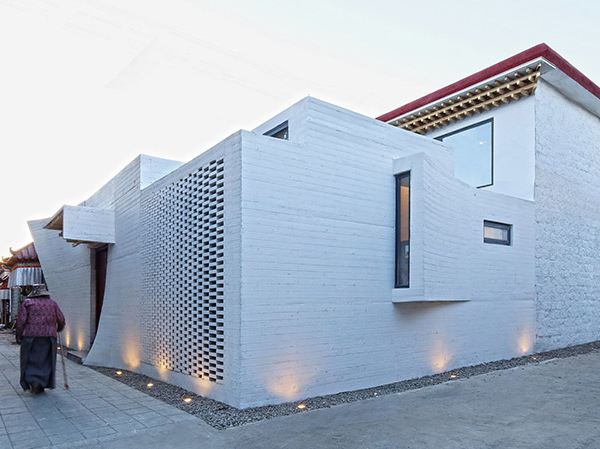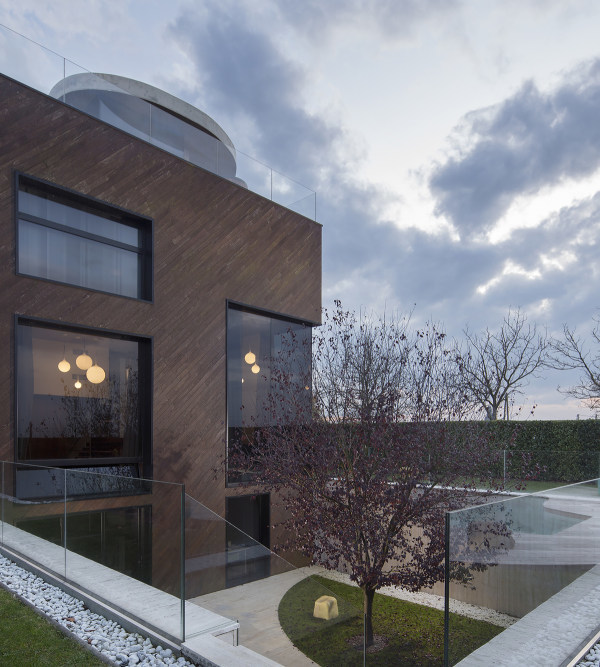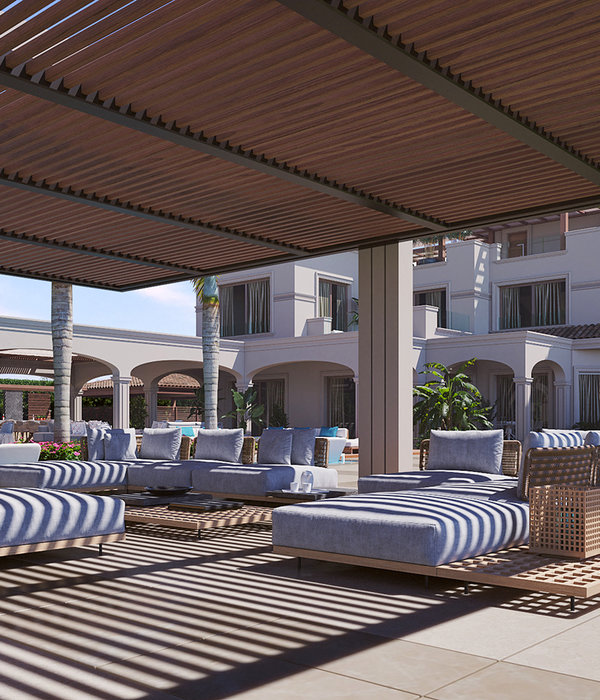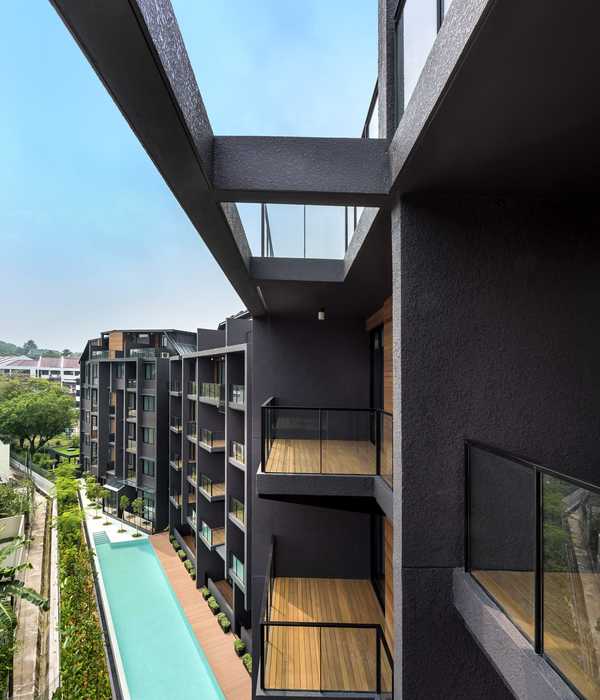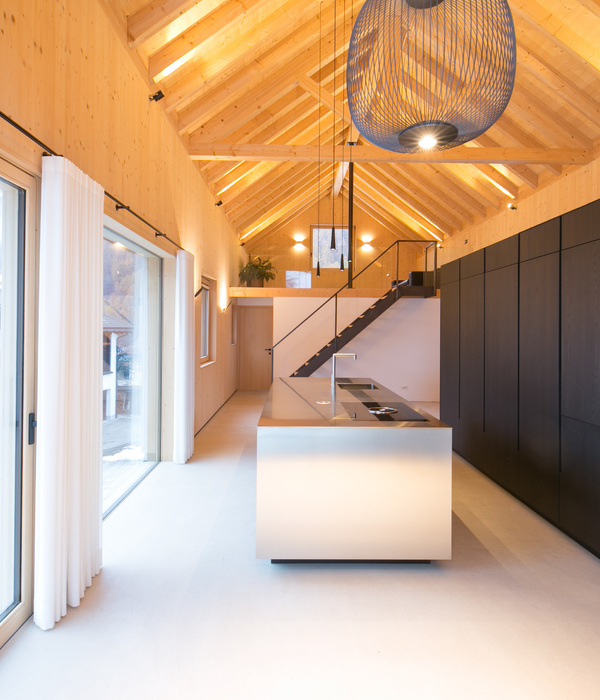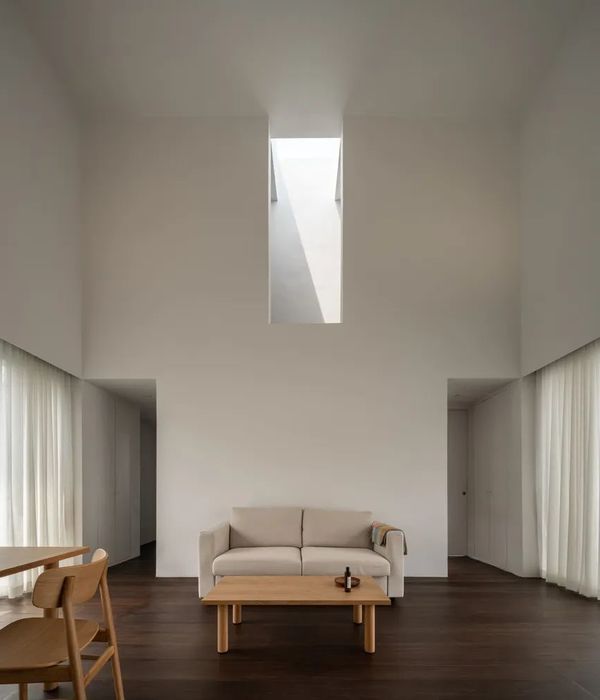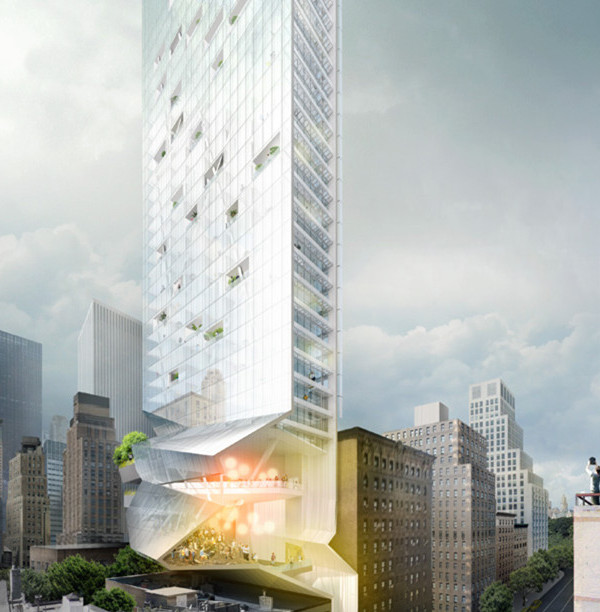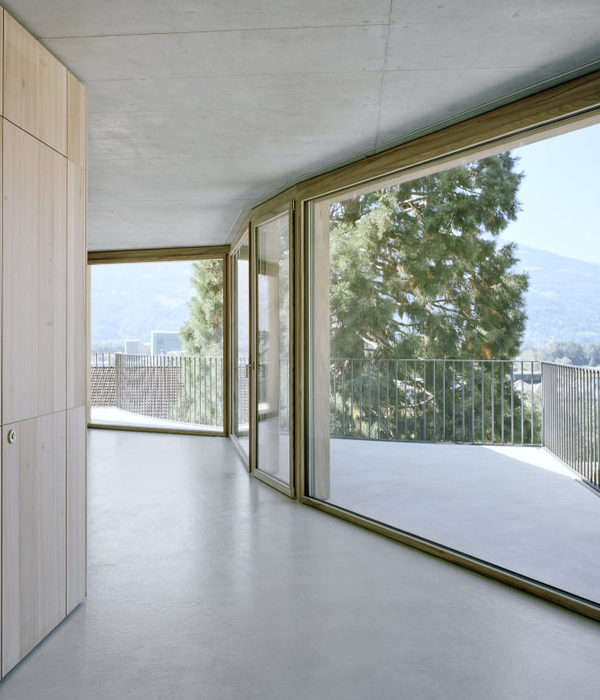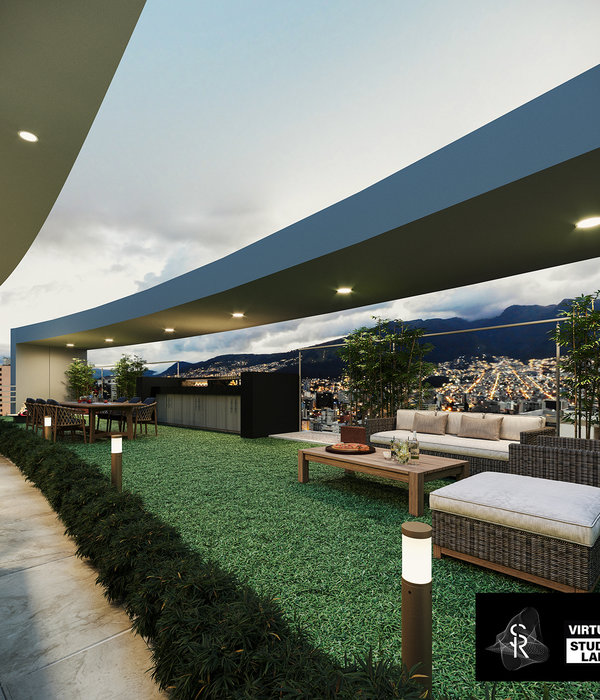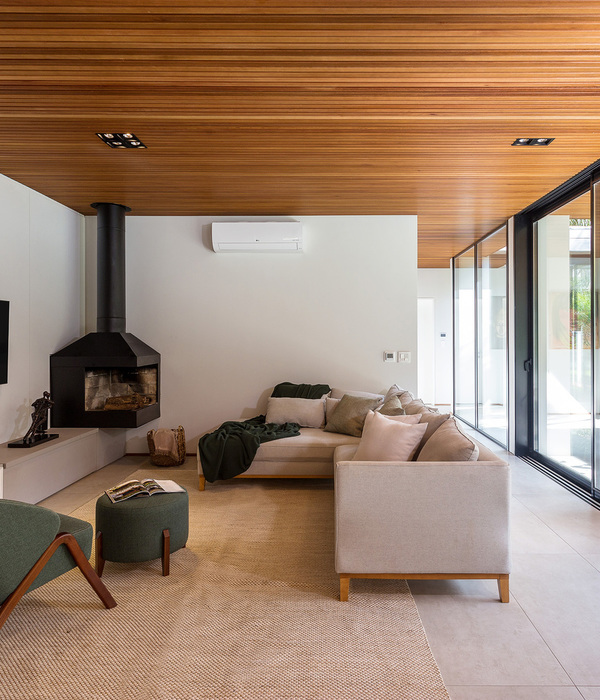近年来,企业下乡已经成为奉贤区乡村振兴的一大特色。作为上市企业总部的乡村基地,英科中心是这一模式的创新案例。基地位于奉贤区黄浦江南岸的一片涵养林之中。原址为一幢五开间双层歇山顶建筑,建于上世纪九十年代,由于年久失修已不复使用。百川纳江,基地北侧与西侧均有浦江支流流过,周围林木茂盛。
In recent years, enterprises setting up offices in countryside has become a distinctive character of rural revitalization in Fengxian District. As the rural base for the headquarter of a listed company, the Intco Center is an innovative case of this trend. The site is located in a conservation forest on the south bank of the Huangpu River in Fengxian District. The original building was a five-bay double-storey building with an Chinese hip-and-gable roof, which was built in the 1990s and was no longer in use due to long years of disrepair. Tributaries of the Huangpu River flow through the north and west sides of the site, which is surrounded by lush forests.
▼鸟瞰,aerial view© 梁山
▼场地环境,context© 梁山
英科再生是一家从事塑料再生利用的高科技制造商,通过循环全产业链,将塑料回收再生与时尚消费品结合起来,生产环保画相框等再生文创产品。业主委托我们在原址上设计一座小型总部,作为英科再生的企业文化展示和高层会议场所。
设计概念来自两个起点的在地结合,即传统民居和企业文化。首先是理水,我们调整了北侧支流的岸线,并将河水净化后引入场地,给整座建筑提供了一个聚水的基座,在上面建造一座新型的合院。
▼位置示意,location map© 山水秀建筑事务所++ 出品建筑事务所
Intco Recycling Resources is a high-tech manufacturer engaged in plastic reuse. Through circulation of the industry chain, it combines plastic recycling with fashionable consumer goods to produce recycled creative cultural products such as eco-friendly picture frames. The client commissioned us to design a small headquarter on the site to serve as a corporate culture gallery and high-level meeting space.
The design concept is a localized combination of two starting points: traditional residence and corporate culture. The first step was water management. We adjusted the shoreline of the northern tributary and introduced the river water to the site after purification. The water is gathered in a platform, on top of which a new form-type of courtyard building was erected.
▼聚水基座上的新型合院,a new form-type of courtyard building was erected on top of a platform© 梁山
▼建筑外观,exterior view© 梁山
▼入口立面,entrance facade© 梁山
奉贤乡村典型的传统建筑形制,即清代起在上海地区盛行的绞圈房,是由四座单层双坡顶建筑围成的合院宅。与北方四合院不同的是,绞圈房合院用正中的“墙门间”(过厅)形成入口,并纯用四面建筑及其檐廊围合“庭心”。
我们的新型合院也采用四个建筑单元围合中庭,在延续这一空间形制的同时尝试通过结构性的空间组织给这一形制注入新的活力。
▼轴测图,axon© 山水秀建筑事务所++ 出品建筑事务所
Jiaoquan House, the traditional architectural form in rural Fengxian district, is a type of courtyard house surrounded by four single-story gable roof volumes, which once prevailed in Shanghai since the Qing Dynasty. Different from the courtyards in northern China, Jiaoquan House uses the “Wall-Door Room” (passing hall) in the middle as the entrance, and its ” courtyard heart” is purely enclosed by the four-sided building and eaves. Our new courtyard form-type also uses four units to enclose the atrium. While continuing this spatial form, we try to inject new vitality into this form-type through structural space organization.
▼建筑外观,exterior view© 梁山
▼外部庭院,outdoor garden© 梁山
整个合院由外圈的半透明院墙、中圈的四个单元体和内圈的庭院构成。4 颗角柱向外伸出枝杈,支撑在外圈连接的四片索网桁架,表面悬挂三角形的风动叶片。镜面氧化铝叶片倒角卷起,随风闪动,如树叶在微风中颤动。这片风动幕墙在为合院筛入自然风的同时,也映射周边的树林和天空,营造出半隐的合院形象;
▼剖透视图,sectional perspective© 山水秀建筑事务所++ 出品建筑事务所
This courtyard building is composed the translucent walls as the outer ring, four volume units as the middle ring, and a central courtyard as the inner ring. At the corner, four columns branch out to support the outer ring of four cable trusses covered by triangular kinetic skin. The mirror-faced alumina blades with rolled-up chamfer flicker with wind, like leaves trembling in the breeze. Natural wind permeates into the inner courtyard through the kinetic screens which also mirror the surrounding woods and sky and create a vague and subtle image of the courtyard.
▼外圈的半透明院墙,the translucent walls as the outer ring© 梁山
▼柱脚与光影,plinth and shadow© 梁山
中圈的单元体放在四个平台上,呈风车状布置,如四艘船首尾相连停靠于水岸,每个单元体由两端的树杈型立柱及双梁支撑屋顶结构,然后向下吊柱挂住二层楼板,这种悬吊结构在建筑底部实现了自由的流动空间,可以满足展览、聚会等多种公共功能的需求,不对称的外墙围合赋予单元体的两一棵立柱不同的呈现方式,一棵在室内通高空间内,与楼梯、升降平台等垂直交通结合,另一棵在室外,成为中圈小院里的人工树。单元体一层有四分之三的外墙用落地玻璃来营造通透性,二层则与一层相反,形成较为私密的办公和会议空间;
▼轴测分解图,axon exploded © 山水秀建筑事务所++ 出品建筑事务所
In the middle ring, the four units are placed on four platforms and arranged like a windmill in the plan, which resembles four ships docking on the waterfront end-to-end. Each unit is supported by two tree-like columns at both ends connected by a pair of beams for the roof structure, and the first floor slab is suspended by the columns hung from the beams. The suspension structure realizes free space at the ground floor, which perfectly meets the needs of various public activities such as exhibitions and gatherings. The asymmetrical plan of exterior walls in each unit gives different status to the two columns supporting it: one is in the indoor full-height void, combined with vertical circulation facilities such as stairs or lifting platforms, and the other is outdoor and becomes a “artificial tree” in the small courtyard. In each unit, three-quarters of the external walls are designed as floor-to-ceiling windows to provide transparency on the ground floor, while the first floor are more enclosed to house more private offices and meeting rooms.▼中圈的单元体放在四个平台上,呈风车状布置© 苏圣亮 In the middle ring, the four units are placed on four platforms and arranged like a windmill in the plan
▼展厅与中央庭院,gallery and central courtyard© 苏圣亮
▼展厅,gallery© 苏圣亮
悬吊结构在建筑底部实现了自由的流动空间,the suspension structure realizes free space at the ground floor© 苏圣亮
▼展厅与水,gallery and water© 苏圣亮
内圈的墙院由一层南北方向的两片混凝土墙和二层东西方向的两片混凝土墙上下搭接组成,墙外形成环廊,墙内围合庭心。这圈交错剪力墙不仅支撑了墙内外的环形双廊(面向中心庭院的外廊与楼梯,与面向单元体的内廊),还通过连桥为外圈的四个单元体结构提供了面外的侧向水平支撑。所有垂直的设备管线都收纳在墙体外围的辅助空间里,为单元体室内空间的纯净和匀质提供了条件。
The inner courtyard is shaped by two pair of staggered shear walls with one pair on the ground floor in south-north direction and another on the first floor in east-west direction. Enclosed by the walls is the heart of the courtyard, while outside is a ring of corridor. These staggered shear walls not only supports the corridors at both sides (the corridor facing the central courtyard, and the corridor facing the units), but also provides horizontal supports for the units’ structures through bridges. All vertical MEP pipelines are installed in the auxiliary space outside the wall, which gives purity and homogeneity to the indoor space of the units.
▼二层走廊,2F corridor© 苏圣亮
通过对结构和材质的组织,我们在外圈、中圈和内圈之间建立了双向的渗透性。抬升的院墙吸引人流,单元体之间的通高玻璃纳入风景,底部的开口导入流水和微风,内外圈之间的天窗则引入自然光:自外而内的流动使合院里的人得以在三重空间里享受微风、流水和天光,如同置身于一个人造的小树林中。与此同时,合院内的展品、交流活动以及合院本身的形象,也通过中圈的小院和外圈的风动幕墙,以若隐若现的渗透方式向外传播着英科再生开放循环的企业文化。
▼节点,detail© 山水秀建筑事务所++ 出品建筑事务所
Through the arrangement of structural system and materials, we established a two-way permeability between the outer ring, the middle ring and the inner ring. The raised courtyard walls welcome people, the floor-to-ceiling windows between units incorporate landscape, the openings at the bottom of exterior walls introduces water and breeze, and the skylight between the inner and outer ring absorbs natural light: In this triple-layered courtyard, the outside-inside flow allows people to enjoy breeze, running water and sky light, making it a special experience like being in a man-made grove. At the same time, the small courtyards in the middle ring and the translucent kinetic skin offer glimpse of exhibitions, activities and the images of central courtyard, which represents Intco’s corporate culture of regeneration and recycling.
▼流水平台与风动幕墙,water platform and kinetic skin© 梁山
外观,exterior view© 苏圣亮
合院作为江南地区传统建筑聚落的基本形制,承载着丰厚的地域文化特征和生活智慧。我们相信当代技术和功用的注入,能够让合院在不断的更新中滋生新的内涵。
As the basic form-type of the traditional settlement in south Yangtze River Delta, the courtyard houses carries rich regional cultural characteristics and wisdom of life. We believe that with the injection of contemporary technology and functions, courtyard buildings will breed new connotations through continuous renewal.
▼从树林望向建筑,view from the grove© 梁山
夜景,night view© 苏圣亮
▼树林与建筑,grove and building© 苏圣亮
远景,distant view© 梁山
▼整体鸟瞰,aerial view © 梁山
▼模型,model©山水秀建筑事务所++ 出品建筑事务所
一层平面图,plan 1F© 山水秀建筑事务所++ 出品建筑事务所
二层平面图,plan 2F© 山水秀建筑事务所++ 出品建筑事务所
▼屋顶平面图,roof plan©山水秀建筑事务所++ 出品建筑事务所
立面图,elevation©山水秀建筑事务所++ 出品建筑事务所
设计单位│山水秀建筑事务所 Scenic Architecture Office + 出品建筑事务所 Doarchi 项目地点│上海市奉贤区庄行镇渔沥村 项目功能│展览、办公、会议 建筑面积│686 m2 设计/建成│2020/2021 主持建筑师│祝晓峰,丁鹏华 设计团队│路遥、唐家佳、杜雪、刘志远、梁家权 业主│上海杭州湾经济技术开发有限公司 结构顾问│缪建波、陈通 幕墙顾问│上海华艺幕墙系统工程有限公司 结构系统│Y 形钢柱梁悬挂结构 建筑材料│氧化铝风动幕墙、花岗石板、青灰色铝板、超白中空 Low-E 玻璃、深灰色铝镁锰立边咬合屋面系统。 影师│苏圣亮、梁山
Office│Scenic Architecture Office + Doarchi
Location│Yuli Village, Zhuangxing Town, Fengxian District, Shanghai
Program│exhibition, office, conference
GFA│686 m²Design/Built│2020/2021
Design Principle│ZHU Xiaofeng, DING Penghua
Design Team│LU Yao, TANG Jiajia, DU Xue, LIU Zhiyuan, LIANG Jiaquan
Client│Shanghai Hangzhou Bay Economic and Technological Development Co., Ltd.
Structure Consultant│MIAO Jianbo, CHEN Tong
Facade Consultant│Shanghai Hanart Facade Specialist CO.,ltd
Structure System│Y-shaped steel column & beam suspension structure
Main Materials│aumina kinetic curtain wall, granite slab, blue-grey aluminum board, low-iron insulated Low-E glass, dark gray aluminum-magnesium-manganese standing seam roof system
Photographer│ SU Shengliang, LIANG Shan
{{item.text_origin}}

